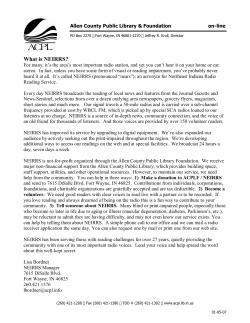
Call for papers as pdf
Call for Papers SOFEIR Annual International Conference 19-‐20-‐21 March 2015, PARIS Venue: A Parisian Itinerary (Université Paris 13-‐Université Sorbonne Nouvelle-‐Université Paris Sorbonne) ‘Unheard Voices’: Telling Stories of Empowerment In a speech marking the centenary of the foundation of Cumann na mBan in April 2014, President Michael D. Higgins reasserted the contribution of women to Ireland’s national history, by stressing: “Yet, their stories have often been silenced in our national narrative, relegated to the shadows by a version of history which attributed solely to men characteristics of heroism derived from military action”. President Higgins’s acknowledgement of the silencing of voices in Irish national history raises the issue of the existence of groups and individuals striving to find a voice and build their own modes of empowerment. In concluding his speech, President Higgins said: “One hundred years on, many wounds have been healed; new possibilities are opening up. In this month of April 2014, we are now ready, not just to cherish the memory and stories of those who fought for Ireland’s freedom, but also to endorse, in imagination and sympathy, the narrative of the other”. In this new context of openness, the conference wishes to look into the various forms and processes disempowered groups and individuals have used to make themselves heard. Consideration will be given to the concept of empowerment which can be broadly understood as a process whereby communities and/ or individuals, who are either oppressed, marginalized or unable to articulate their personal stories, gain greater control over their lives and their social, political and cultural environment. Drawing on approaches informed by Subaltern Studies (A. Gramsci, E. Said and J.C. Scott), it would be relevant, for instance, to assess and analyze in an Irish context the various strategies individuals and communities have developed to assert themselves and gain recognition. The exploration of storytelling – as a process through which unheard voices may find a path to empowerment – also offers multiple avenues of investigation. This conference proposes to look at stories of empowerment from a variety of perspectives, including history, political science, anthropology, sociology, literature and the arts, and will consider whether they constitute a genuine alternative and a challenge to existing norms, institutions and forms. It will also examine to what extent the story-‐telling process creates potential new narratives of resistance, contesting power structures that silence voices. SOFEIR: Société Française d’Etudes Irlandaises. www.sofeir.fr Topics may include, but are not limited to: Exploring ‘unheard voices’ in Irish arts, literature, music • Poetic forms of empowerment • Fictions of empowerment • A Voice of One’s Own: women’s stories of empowerment • Finding one’s voice: autobiographical writing as a form of empowerment • ‘Unheard voices’: redefining the Irish literary canon? • Rewriting Irish history from below: ‘Unheard’ voices’ in historical fiction • Silenced voices: literature and censorship • Dissident voices in popular music • Storytelling and empowerment • Theatre and Empowerment / Cinema and Empowerment • Participatory Arts projects. Community Arts projects • The legacy of Freire and Boal (Education and drama as forms of empowerment) Silent voices getting vocal in the social, cultural, political, historical domains • Women, youth, LGBT, migrants, Travellers in Ireland • Dissenting voices in politics, protest groups in the Irish context • Testimonies and empowerment: the role of testimonies in remembering/commemorating/history. Working through trauma for individuals and communities • Empowerment and feminism: feminist movements North and South. Support and victim groups (e.g. Justice for Magdalenes, Adoption Alliance Group). Women migrants in Ireland. • ‘Unheard voices’ in the peace process in Northern Ireland. Judicial, extra-‐judicial – transitional -‐ justice processes. Local peace initiatives • Community engagement and participation: the emergence, development and evolution of participatory and/or collaborative practices at grassroots level • Writing History from the point of view of “unheard” minorities: towards a new narrative of Irish National history? (e.g. unheard voices in Irish women's history) • Empowerment through the use of social networks and community media • Nature and impact of ‘acknowledging’ unheard voices • Limits of institutionalized / state-‐led empowerment: e.g. the empty rhetoric of empowerment, notably in public policy (possible fields of study: urban regeneration, neighbourhood renewal, health, education) Organising and Scientific Committee: Fabrice Mourlon (Université Paris 13), Nathalie Sebbane (Université Sorbonne Nouvelle-‐Paris 3), Hélène Alfaro-‐ Hamayon (Université Paris-‐Est-‐Marne-‐la-‐Vallée), Joana Etchart (Université Paris Sorbonne), Claire Masurel-‐ Murray (Université Paris Sorbonne), Virginie Roche-‐Tiengo (Université Paris 13) We welcome proposals for twenty-‐minute papers, preferably in English. Please send a 300-‐350-‐word abstract and a short biographical note by 30 October 2014 to: Arts-‐Community Arts: Hélène Alfaro-‐Hamayon : hamalfa@orange.fr Literature : Claire Masurel-‐Murray : c.masurelmurray@gmail.com Civilisation (history, political science, sociology, anthropology) : Nathalie Sebbane : nathalie.sebbane@gmail.com Joana Etchart : jeigiber@hotmail.com Fabrice Mourlon : fabricemourlon@me.com
© Copyright 2025












